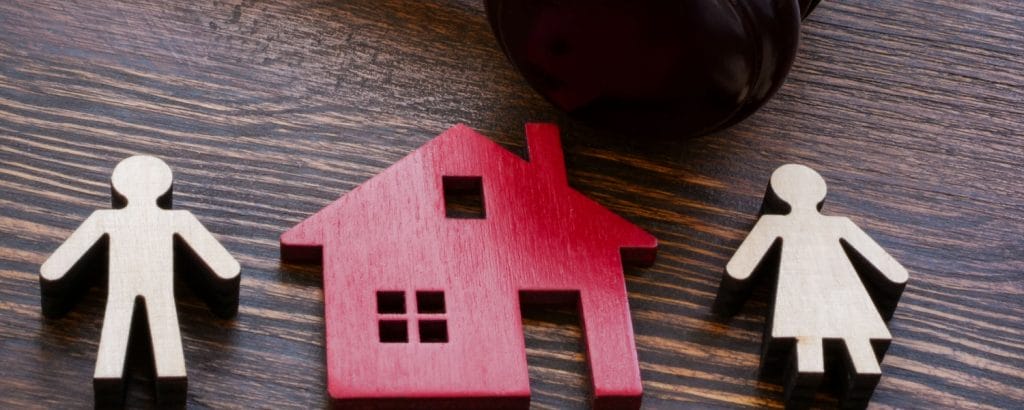Divorce is a life-altering event that brings forth a wave of emotional, financial, and legal challenges. When a couple who jointly owns a home decides to part ways, the process can become even more complex. Beyond the emotional toll, the intricacies of property division, financial implications, and the legal procedures involved can make divorce an overwhelming experience. In this article, we will delve into what happens when you divorce and you own a home together, exploring key considerations and steps to navigate this challenging terrain in Illinois.

Property Division: The Marital Home
When a married couple owns a home together, the property typically falls under the category of marital assets, subject to division during divorce proceedings. This is also called joint home ownership. The division process depends on the jurisdiction’s laws, which could either be community property or equitable distribution. Community property states generally consider marital assets to be jointly owned and therefore split 50/50 between the parties. Equitable distribution states aim for a fair and equitable distribution of property based on various factors but will not require assets to be split 50/50. In Illinois, courts follow the philosophy of equitable distribution.
Options for Handling the Home
Once the status of the marital home is established, couples have several options for handling the property during divorce:
- Sell the Home: Selling the home and dividing the proceeds is a common choice. This approach provides a clean break, allowing both parties to move forward independently. However, market conditions, emotional attachments, and timing can all impact this decision.
- Buyout: One spouse may choose to buy out the other’s share of the home. This option can be appealing when there are emotional attachments or when one party intends to continue living in the house, especially if children are involved.
- Co-ownership: Some couples opt to maintain co-ownership of the home, even post-divorce, particularly if it serves as a stable residence for their children. This arrangement requires a carefully drafted co-ownership agreement that outlines responsibilities, expenses, and future sale arrangements.
- Deferred Sale: In some cases, especially when housing markets are unstable, couples might agree to delay selling the home until a more opportune time. During this period, one party may continue living in the house, but both parties will need to agree on maintenance, costs, and potential future sale terms.
Both parties should communicate their desires. Communication can be hard, especially during divorce proceedings. If you are able to communicate with your spouse you may want to try mediation. Mediation is an alternative to traditional divorce proceedings where a nuetral third party mediator will meet with both parties to create a custom divorce agreement. During mediation spouses, or your lawyers, can work to compromise on an agreement that benefits both parties. To learn more about mediation check out our soon to be published article titled “What Are The Benefits of Divorce Mediation?“
If there isn’t a clear conclusion reached between the both of you then it is best to seek out a lawyer to help with the sale of the home or the transition of title. Otherwise a mediator can offer potential solutions, or the court will usually require the home be sold. To see what some of the forms invovled in a divorce with property, check out the Illinois Courts website.

Financial Considerations
When going through a divorce and you own a home together there are financial implications that can be far-reaching, and should not be underestimated:
- Mortgage Responsibility: If both spouses’ names are on the mortgage, they remain jointly responsible for making payments. Failing to do so could negatively impact both parties’ credit scores. If one spouse assumes the mortgage, the other might need to be removed from the loan through refinancing or other means.
- Equity Division: When determining how to divide the equity from the sale of the home, it’s essential to factor in initial contributions, mortgage payments, and market appreciation. Consulting a financial advisor can help ensure a fair distribution instead of dividing the value of the home into two equal shares.
- Tax Implications: The sale of a home can trigger capital gains taxes. However, divorcing couples may be eligible for exclusion from these taxes if the sale of the home occurs within 1 year after the date on which the marriage ceases. Consulting a tax professional or attorney is recommended to navigate this aspect.
Keep in mind you will also have other costs associated with the divorce process. You may have to pay child support and/or alimony after an agreement is reached or the court makes a decision. If you want to learn more about child support and alimony, check out our article titled “How Does Child Support Work If the Mother Has No Job?”
Legal Steps
Navigating the legalities of divorce and joint home ownership requires a thorough understanding of the local laws and proper documentation:
- Property Agreement: If the couple has a prenuptial or postnuptial agreement in place, it may include provisions about the home’s division. In the absence of such an agreement, local laws will dictate the process.
- Property Valuation: In Illinois, establishing the home’s value is crucial for an equitable distribution. Professional appraisers can provide an objective assessment of the property’s worth. It is important to do this step before the sale of the home.
- Legal Documentation: The divorce decree must outline the terms of property division clearly. If one spouse is assuming ownership, this should be reflected in legal documents and, if necessary, the mortgage refinancing process. There are many different solutions to every problem in Family Law. As long as the language is clear and both parties agree then you can divide the assets however you see fit.

Emotional Well-being
Amid the legal and financial intricacies, the emotional aspect should not be overlooked:
- Communication: Open and respectful communication is key. Collaboratively discussing the fate of the home can lead to smoother decision-making. It’s not always easy to talk to your ex, especially during divorce proceedings, but keeping an amicable relationship with them will make decisions regarding the house easier. Remember, if you co own a house together then you usually live in that house with your ex. If this does not sound suitable/possible then you should not live in the house together.
- Child’s Perspective: If children are involved, their well-being and stability should be a priority. The decision about the home should consider their needs and routines. Judges prioritize the wellbeing of the children involved above all else. Keep that in mind when considering your options.
- Seek Support: Divorce is emotionally taxing. Seeking support from friends, family, therapists, or support groups can help manage the stress and emotions that arise during this period.
Conclusion: What Happens When You Divorce and You Own a Home Together?
Divorcing while jointly owning a home adds a layer of complexity to an already challenging process. As couples navigate the legal, financial, and emotional aspects, it’s essential to prioritize effective communication, seek expert advice, and make well-informed decisions that align with their individual circumstances. Remember that while the path ahead may seem daunting, with the right approach and support, it’s possible to find a resolution that allows both parties to move forward with their lives.
MEET WITH AN ILLINOIS FAMILY LAW ATTORNEY TODAY
The Family Law attorneys at Koth Gregory & Nieminski understand that your family is the top priority, which is why we offer SAME-DAY APPOINTMENTS. If you need a divorce or other family law services, you can schedule your first meeting through our online appointment calendar. We look forward to meeting you.
Disclaimer: This article (What Happens When You Divorce and You Own a Home Together?) may contain information that is outdated as Illinois law continuously evolves. Meeting with an experienced family law attorney is the best way to ensure you are receiving the most current information to answer the question What Happens When You Divorce and You Own a Home Together?

Published by Dustin Koth on March 7, 2024
